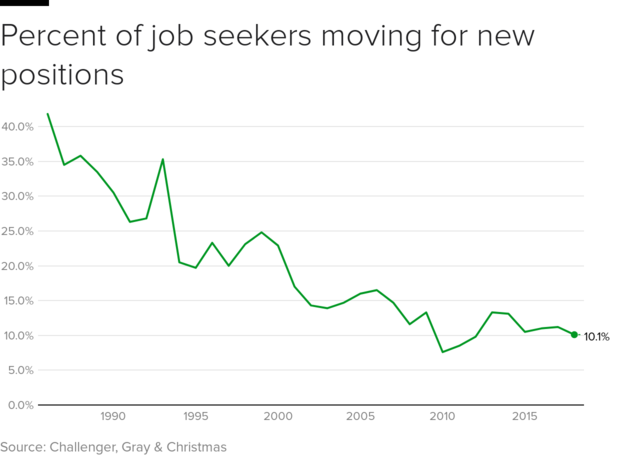Fewer Americans are moving for work than ever
Location is everything—except, it seems, when it comes to employment.
The number of Americans relocating for a new job has dwindled during the last decade, a significant change from the late 1980s when more than a third of job seekers were willing to pick up and move for employment.
Over the past decade, 11 percent of job seekers relocated for work, compared to nearly 19 percent who relocated for greener employment pastures in the prior decade, according to findings from Challenger, Gray & Christmas.
Just over 10 percent of job seekers relocated for work in the first six months of 2018, holding steady with relocation rates in the first half of last year, the outplacement consultancy found. The relocation rate in the third quarter of 2017 rose to 16.5 percent, the highest quarterly rate since 2009, Challenger found. Yet by the fourth quarter of 2017, the rate of relocated job seekers came to 7.5 percent, bringing to 11.2 percent the yearly average.
In 2000, the relocation rate was 22.9 percent, the last year the rate hit above 17 percent, according to Challenger, which based its numbers on a survey of about 1,000 job seekers who found employment each quarter. Since then, the annual relocation rate for job seekers has averaged 12.7 percent.
Companies flush with cash during the dot-com era were able to offer generous relocation packages to attract employees, a scenario that changed in 2000, when the dot-com bubble blew up, Andrew Challenger, vice president of Challenger, said in a statement. "That burst led to an increase in job cuts nationwide, and this period seems to delineate the end of the relocation trend," added Challenger, who noted cost-cutting moves by employers kept a lid on relocation reimbursements in subsequent years.
Additionally, workers can now do many jobs from anywhere, thanks to technology, leaving more employees working remotely instead of going through the upheaval that comes with moving to a new location.
Separate evidence illustrates another geographical trend that had well-paid, highly educated people moving to high-cost coastal cities during the last 10 years, while lower-income, less educated people have moved out.
And, while some workers presumably have little choice when it comes to work and where they live, a study several years ago found that contrary to what some might think, millionaires in the U.S. are neither likely to pick up stakes nor to flee their state of residence just to lower their taxes.




